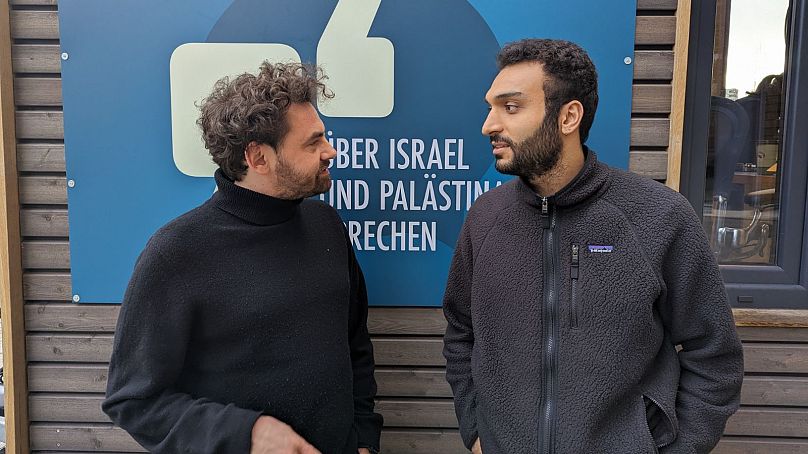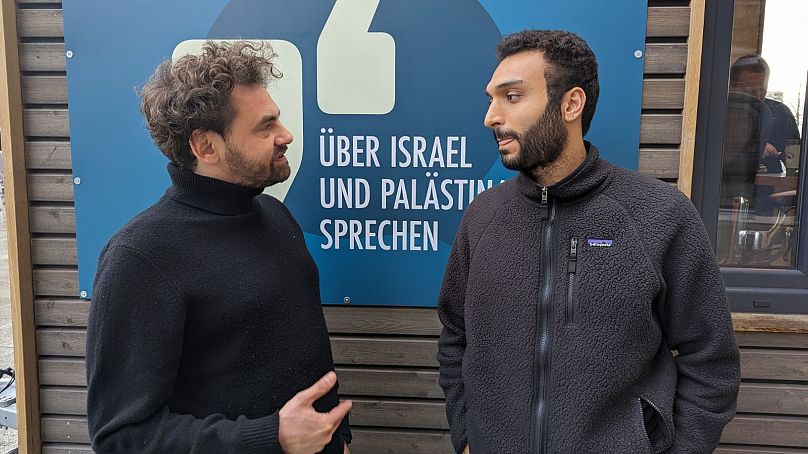While the highly politicised 74th edition of the Berlinale ended with the announcement of an investigation and accusations of antisemitism, there was one small location trying to do some good during the festival. Euronews Culture met the people behind the Tiny Space initiative.
Amidst the glitz, tension and controversy of this year’s Berlin Film Festival was a small cabin, located a stone’s throw away from the red carpet.
Walk towards it and you could see a rather apt sign on the side of the wooden hut: 'Tiny Space'.
The project, conceived by Shai Hoffmann and Jouanna Hassoun, who have Israeli and Palestinian roots respectively, invited festival attendees to discuss and debate the contentious issue of the war in Gaza inside the intimate location. The meetings with changing participants didn’t have fixed beginnings or ends, but instead allowed interested parties to drop by at any time, aiming to engage people in a society where polarized stances are often expected.
Euronews Culture caught up with Shai Hoffmann and Ahmad Dakhnous, Palestinian student and co-founder of the “Connect! Syrian Diaspora” initiative, to discuss the Tiny Space project and the power of dialogue to bring about change.
Euronews Culture: Can you talk about the format of Tiny Space, and why you chose this particular setup instead of the larger forum for discussions?
Shai Hoffmann: As the initiator of Tiny Space and the trialogues that we are conducting in schools in Germany, I can say that we've experienced that it's really important to establish smaller spaces in order to create room for expressing emotions, and to talk about this feeling of disorientation in a lot of people that especially came up after the 7 October. A larger space with hundreds of people can make it harder to speak. That’s why it’s very important to have a more intimate space.
And that's why I came up with the trialogue project, and in December, I decided to also launch a podcast in order to make Palestinian voices and other Israeli Jewish voices more apparent.
The Berlinale approached us and asked us if we want to conduct a trialogue, which means me and a Palestinian together with the visitors. And this is why we created this format.
How popular has the initiative been during the Berlinale?
Shai Hoffmann: We had a lot of people here. It was packed like never before, actually. We discussed very controversial matters, but they were discussions not that much about emotions and feelings, but very political ones.
You say that the discussions have been more political rather than emotional. Have there been any reactions that have surprised you?
Ahmad Dakhnous: There were some very heated political debates, which is totally fine. This is what this place is also about. Yesterday, we had a person who talked about a dispute in her partnership. We had people talking about situations in their families. We had people who are feeling pressure within their friendship groups and family constellation. It has been very emotional, actually, but we had also people who came with questions and insecurities around the subject because they work in the public sphere. We had teachers who are struggling with certain situations at school. We had people from the cultural and art industry...
It doesn’t matter what political thought they have - everybody appreciated the fact that they had the opportunity to talk about it. They took time. It was calm. Sometimes it wasn’t calm, but people had the opportunity to listen, to talk, and to say what they feel and think.
How was the moderation?
Ahmad Dakhnous: We didn't have taboo words or topics, as you often see in the public sphere. That debate can be quite toxic. Here, you can actually say a lot. The limits are very wide. But of course, we also have certain situations where it touches us also.
Shai Hoffmann: We're not tabooing anything or scandalizing anything. However, there is an end to dialogue if someone leaves the ground of our constitution, let's say. So, if someone is advocating for or justifying violence, then I, as a Jew whose family is suffering, I would end the dialogue if this person is not open to also hearing my grief about it.
Has that happened during the time at the Berlinale?
Ahmad Dakhnous: There were two or three situations where I had to make a clear statement that I disagreed. And I explained why I disagreed. But respectfully, without tabooing the topic. Generally, I go pedagogically around the topic and I ask questions to try to understand, and open the discussion. In those cases, I had to make a clear statement.
Can you give me an example?
Ahmad Dakhnous: Well, one person used very clear racial stereotypes and denied the very existence of a Palestinian identity and Palestinians. He was like, “What is Palestinian? What does that mean? It's only just the family clans.” And that was, for me, a clear point where I had to say that I didn’t agree. Another one tried to relativise the suffering of death and the pain of the Palestinian people in Gaza today. That was also a moment for me to say something. These were instances where I thought that it was part of my duty as a moderator to act and to set some limits.
Do you feel like the Berlinale has done enough or that an international film festival like this is the best place and the best time to be doing this?
Shai Hoffmann: I would ask you: What is enough? In the end, I think we've reached more with this project on an individual level than a panel discussion of 45 minutes. Here, people come and they ask questions. They can say what they feel. You have a whole different access to an emotional level of people here.
Ahmad Dakhnous: The only perfect thing in this context is to stop this massacre, to reach a political solution to end this. We cannot do this. We're not politicians. What we can do is to open a dialogue. You cannot do it perfectly in this conflict. But this is a good enough, and good enough is good enough!
Shai Hoffmann: To add something to this... There is the societal level dimension. Observing what happens here in Germany after the 7 October and how politicians try to divide our groups of minority within the society... Our duty, with the privileges that we have here, is to not divide. And this is the best thing to show. We’re also going out to schools, and students are often shocked to see a Palestinian and a Jew standing in front of them! They cannot imagine now, after 7 October, that two of us can hold a dialogue. I think it's a strong sign to show that we should never let politicians, as well as certain media outlets in Germany trying to fight anti-Semitism with racism, divide us.
On the red carpet, there have been displays of solidarity from certain artists and guests - a badge, a ceasefire sign... It’s a good platform because the Berlinale is such an international festival. But sometimes, it can feel like its performative or even empty solidarity. How do you respond to the celebrity mediatisation of activism?
Shai Hoffmann: That's a very good question...
Ahmad Dakhnous: The people who can change something in this conflict, the politicians with power, are not doing something. And I wonder, what can we do? What can anybody do? Civic society, but also actors and artists... I mean, why not? There is a right to protest, and if they choose this platform to do this, with this level of reach, then sure - why not?
Shai Hoffmann: This is an international film festival, and in general, festivals offer a platform to be political. It doesn't necessarily mean that the film festival itself has to have a political opinion, but it offers a platform for filmmakers. Like No Other Land, for instance. That is a very critical film. This is the potential that a film festival has. And if you have people that need to express their political views with badges and so on - great. As long as it's not antisemitic and not racist.
How do you respond to more hateful comments or displays of anger from people who aren't open to dialogue?
Ahmad Dakhnous: We had a few people who stood in front of the door and said “Why discourse? Why dialogue? We cannot change anything with dialogue. We need political action, we need to change things.” We opened the space and said, “Yes, tell me more about this. What do you mean by that? What can we do as a civic society?” I don't know if they changed their minds, but by engaging in conversation, they ended up going from shouting outside the door to sitting right in front of me, and actively taking part in the debate.
Shai Hoffmann: They followed the invitation to dialogue. Of course, we’ve had the critique that this place is far too tiny for this big problem. But as a civic society, as Ahmad says, we can offer a dialogue. And it worked out.













